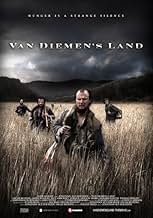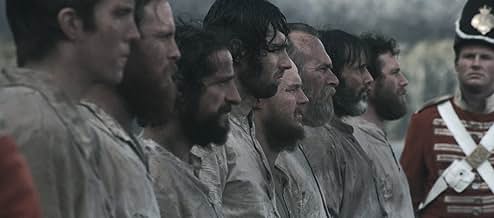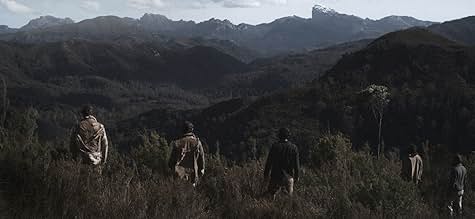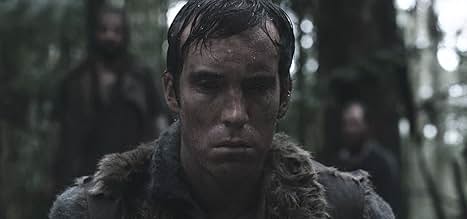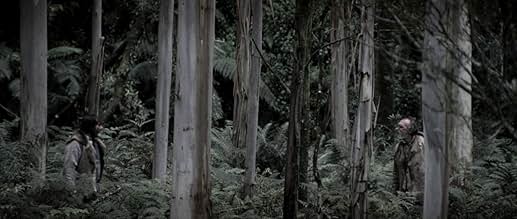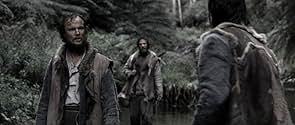ÉVALUATION IMDb
5,9/10
3,5 k
MA NOTE
Ajouter une intrigue dans votre langueAlexander Pearce, Australia's notorious convict, escaped Macquarie Harbour in 1822, finding the harsh Australian wilderness and abandoning hope in the harsh Australian wilderness.Alexander Pearce, Australia's notorious convict, escaped Macquarie Harbour in 1822, finding the harsh Australian wilderness and abandoning hope in the harsh Australian wilderness.Alexander Pearce, Australia's notorious convict, escaped Macquarie Harbour in 1822, finding the harsh Australian wilderness and abandoning hope in the harsh Australian wilderness.
- Director
- Writers
- Stars
- Prix
- 2 victoires et 1 nomination au total
Thomas M. Wright
- Thomas Bodenham
- (as Thomas Wright)
Zane Pinner
- Convict
- (uncredited)
Avis en vedette
Despite moving at a slow pace and sometimes lacking in exposition, Van Diemen's Land is an impressive film. The story of Alexander Pearce's escape, along with 7 other convicts is gut-wrenching, especially when we take into account it is inspired by a true story (to which extent, we may never know).
As soon as the movie begins, you are hit by jaw-dropping cinematography that definitely takes you in this very different place and time. Silences and sounds are used to good effect and the minimalist score is wonderful yet bleak. The movie does not rely on much dialogue and at times, suffers a little from this
The characters are very life-like, even if they aren't sketched very clearly to start. You learn who these men are and what each is capable of over the course of the movie, which becomes increasingly bleak and permeated with a strange sense of evil. Not a cartoonish Hollywood-like evil but rather, the terrible things men can do and the group dynamics displayed when acts of cruelty are done.
The narration by the character Pearce did not work all that well for me, and the movie felt a tad long to me due to its slow pace but this was an uneasy viewing. The genre listed on IMDb is "thriller" but this felt much more like a very, very gruesome drama. This is a film bordering on horror themes. Do not expect flashy scenes of action and clear cut good guys against bad guys.
Worthwhile, even if somewhat depressing
As soon as the movie begins, you are hit by jaw-dropping cinematography that definitely takes you in this very different place and time. Silences and sounds are used to good effect and the minimalist score is wonderful yet bleak. The movie does not rely on much dialogue and at times, suffers a little from this
The characters are very life-like, even if they aren't sketched very clearly to start. You learn who these men are and what each is capable of over the course of the movie, which becomes increasingly bleak and permeated with a strange sense of evil. Not a cartoonish Hollywood-like evil but rather, the terrible things men can do and the group dynamics displayed when acts of cruelty are done.
The narration by the character Pearce did not work all that well for me, and the movie felt a tad long to me due to its slow pace but this was an uneasy viewing. The genre listed on IMDb is "thriller" but this felt much more like a very, very gruesome drama. This is a film bordering on horror themes. Do not expect flashy scenes of action and clear cut good guys against bad guys.
Worthwhile, even if somewhat depressing
Having seen a documentary about this story a few years ago, I was enraptured by the story and absorbed until its conclusion. When I heard a film was in production, I was interested to see how it would be translated into a motion picture.
This should by no means considered a film that delivers on the potential of this story.
I suspect budgetary restraints ruled out the possibility of opening scenes such as the prisoner's arrival at Hell's Gates as the prisoners rowed for their lives through the stormy sea. Scenes in the courtroom where Pearce is confronted with the horror of his deeds were similarly ruled out. I also believe budgetary restraints were at the root of so much of the landscape views of Tasmania we were 'treated' to- a previous comment said the film works as an ad for the area, I didn't rent the film to see an ad for the landscape of Tasmania!
In one scene the director focuses on a mountain top for longer than five seconds (It was long enough for the thought to enter my mind- did he hike up here with a camera and say, well I made it up here so this shot is taking up at least six seconds of this movie!)
Budgetary constraints doesn't mean the film couldn't have been successful, engrossing, and in some ways this gave it an advantage over any big-budget films that may succeed it. Whereas they would spend time on back-story, by cutting straight to the shock value of the cannibalistic 'middle part of a possible trilogy' as suggested by an earlier comment, Auf Der Heide could have given a definitive interpretation of it. Time saved on earlier scenes could have been used to give more depth to the inter-group dynamics, leaving the viewer wondering 'who would be voted off next', in a Survivor-like scenario.
If you're making a film like this with a low budget, the focus has to be more on the human aspects of the group. For this to work, a strong narrative voice explaining the group dynamics was needed. Pearce would have been ideal for this, but instead we were presented with 'the quiet man', which proved disastrous.
Where could the film have succeeded in the context of it having a relatively low budget? How could it have better elicited tension and emotions?
· Fleeing the prison- dialogue about having to escape the deadly conditions would have helped us see the need for escape
· The decision to resort to cannibalism- the portrayal of how the resources diminish isn't done in a way that builds tension, it's merely documented. Members of the party were unaware whilst the others plotted, and the first murder took place at night while the first victim slept. This scene should have been shot through the ignorant ones' eyes as they wonder what's become of the group.
· This could have been followed by dialogue between the two who ran away about how they thought they were next and the plan of their subsequent escape from the group.
· Explaining the sub-groups; the miracle of Pearce's survival is that he was the outsider from the point where there was at least 4 left and in theory he should have been next in the pot. A narrative from him detailing these fears could have done wonders.
· When it came down to the two men, the pact that took place between the two men to renounce cannibalism has no place in the film. This could have been developed the theme, added to the tension as we question the two men's sincerity or even broken the pervasive silence.
· There was no moment of catharsis where he reaches the village and is 'saved', if a man can be saved after what he has been through.
Ultimately it's a poor script that failed to bring out the potential of the subject matter or to deliver any character I would either remember (the Alexander Pearce of my memory is the one whose character was explored in the documentary I saw) or whose survival I actually cared about even in the closing scenes of such dramatic potential.
This should by no means considered a film that delivers on the potential of this story.
I suspect budgetary restraints ruled out the possibility of opening scenes such as the prisoner's arrival at Hell's Gates as the prisoners rowed for their lives through the stormy sea. Scenes in the courtroom where Pearce is confronted with the horror of his deeds were similarly ruled out. I also believe budgetary restraints were at the root of so much of the landscape views of Tasmania we were 'treated' to- a previous comment said the film works as an ad for the area, I didn't rent the film to see an ad for the landscape of Tasmania!
In one scene the director focuses on a mountain top for longer than five seconds (It was long enough for the thought to enter my mind- did he hike up here with a camera and say, well I made it up here so this shot is taking up at least six seconds of this movie!)
Budgetary constraints doesn't mean the film couldn't have been successful, engrossing, and in some ways this gave it an advantage over any big-budget films that may succeed it. Whereas they would spend time on back-story, by cutting straight to the shock value of the cannibalistic 'middle part of a possible trilogy' as suggested by an earlier comment, Auf Der Heide could have given a definitive interpretation of it. Time saved on earlier scenes could have been used to give more depth to the inter-group dynamics, leaving the viewer wondering 'who would be voted off next', in a Survivor-like scenario.
If you're making a film like this with a low budget, the focus has to be more on the human aspects of the group. For this to work, a strong narrative voice explaining the group dynamics was needed. Pearce would have been ideal for this, but instead we were presented with 'the quiet man', which proved disastrous.
Where could the film have succeeded in the context of it having a relatively low budget? How could it have better elicited tension and emotions?
· Fleeing the prison- dialogue about having to escape the deadly conditions would have helped us see the need for escape
· The decision to resort to cannibalism- the portrayal of how the resources diminish isn't done in a way that builds tension, it's merely documented. Members of the party were unaware whilst the others plotted, and the first murder took place at night while the first victim slept. This scene should have been shot through the ignorant ones' eyes as they wonder what's become of the group.
· This could have been followed by dialogue between the two who ran away about how they thought they were next and the plan of their subsequent escape from the group.
· Explaining the sub-groups; the miracle of Pearce's survival is that he was the outsider from the point where there was at least 4 left and in theory he should have been next in the pot. A narrative from him detailing these fears could have done wonders.
· When it came down to the two men, the pact that took place between the two men to renounce cannibalism has no place in the film. This could have been developed the theme, added to the tension as we question the two men's sincerity or even broken the pervasive silence.
· There was no moment of catharsis where he reaches the village and is 'saved', if a man can be saved after what he has been through.
Ultimately it's a poor script that failed to bring out the potential of the subject matter or to deliver any character I would either remember (the Alexander Pearce of my memory is the one whose character was explored in the documentary I saw) or whose survival I actually cared about even in the closing scenes of such dramatic potential.
This feels like a 'Tourism Tasmania' commercial with a touch of cannibalism, truly a great combination.
The movie is based on the true account of Alexander Pearce, Australia's most notorious convict, and the events that took place in 1822, as Pearce and a group of convicts escape into the Tasmanian wilderness. The group is then left at the mercy of nature, themselves, and notably the human desire to eat.
This is truly a beautiful movie, the cinematography of sweeping landscapes and rugged bushland is worth watching the rental/ticket price alone. It strikes me as the type of DVD they play in appliance stores to show off the new HD-TVs (although they would have to skip the numerous bludgeoning scenes).
The story itself is a simple and tight narrative of the human condition pushed to its limits. While there is some grizzly violence and confronting concepts, the movie never descends into gratuitous visuals based purely on shock value.
While the story is compelling and rolls along nicely, I found myself just wanting a little more depth to all of the supporting characters. This is also one of the main strengths of this film, it makes you want more; I was always wondering what was going to happen next, what's that guy going to do, where are they going, what's around that corner, what does that taste like etc Ultimately this factor leaves the viewer a tad unsatisfied yet appreciative of the movie as a whole.
On the Fruit-Meter, Van Demons Lands gets the "KIWI-FRUIT" - A bit grizzled and rough on the outside, but once you peel off the skin it's fresh and tasty, but it was a small fruit and I want some more.
MART-FLIX PUN-FUN – It's compelling to watch convicts battle their inner "demons" ..that sucked
The movie is based on the true account of Alexander Pearce, Australia's most notorious convict, and the events that took place in 1822, as Pearce and a group of convicts escape into the Tasmanian wilderness. The group is then left at the mercy of nature, themselves, and notably the human desire to eat.
This is truly a beautiful movie, the cinematography of sweeping landscapes and rugged bushland is worth watching the rental/ticket price alone. It strikes me as the type of DVD they play in appliance stores to show off the new HD-TVs (although they would have to skip the numerous bludgeoning scenes).
The story itself is a simple and tight narrative of the human condition pushed to its limits. While there is some grizzly violence and confronting concepts, the movie never descends into gratuitous visuals based purely on shock value.
While the story is compelling and rolls along nicely, I found myself just wanting a little more depth to all of the supporting characters. This is also one of the main strengths of this film, it makes you want more; I was always wondering what was going to happen next, what's that guy going to do, where are they going, what's around that corner, what does that taste like etc Ultimately this factor leaves the viewer a tad unsatisfied yet appreciative of the movie as a whole.
On the Fruit-Meter, Van Demons Lands gets the "KIWI-FRUIT" - A bit grizzled and rough on the outside, but once you peel off the skin it's fresh and tasty, but it was a small fruit and I want some more.
MART-FLIX PUN-FUN – It's compelling to watch convicts battle their inner "demons" ..that sucked
It definitely worth watching! It is a film that reveals the evil side of the humanity, but because it is not an action film or a romantic film, so i give it 8/10. Also, the reflection on humanity disgusted me and which define the film as a thriller. It is a good opportunity to know the history by watching this film, and to think about what action we would take if we were in that position, deeply review ourselves.
It's based on a true story. The music, cinematography and the acting was superb. I love this movie, the bleakness, the nature..it's really interesting to see something darker about human nature.if you want something fun then this movie isn't for you. The music when the credits roll...outstanding! I never written a review before nor will it probably help you in anyway but it justifies that how much i love this movie.
sorry for my bad English
sorry for my bad English
Le saviez-vous
- AnecdotesOne of three Australian feature films made during the late 2000s about Irish convict Alexander Pearce. The three movies are: 'Dying Breed' (2008), 'Van Diemen's Land' (2009) and 'The Last Confession of Alexander Pearce' (2008) (TV).
- Citations
Alexander Pearce: A man with no blood on his hands is no man.
- ConnexionsFeatured in A Journey Up River: Making Van Diemen's Land (2009)
Meilleurs choix
Connectez-vous pour évaluer et surveiller les recommandations personnalisées
- How long is Van Diemen's Land?Propulsé par Alexa
Détails
- Date de sortie
- Pays d’origine
- Langues
- Aussi connu sous le nom de
- Savage Island
- Lieux de tournage
- sociétés de production
- Consultez plus de crédits d'entreprise sur IMDbPro
Box-office
- Brut – à l'échelle mondiale
- 34 648 $ US
- Durée
- 1h 44m(104 min)
- Couleur
- Mixage
- Rapport de forme
- 2.35 : 1
Contribuer à cette page
Suggérer une modification ou ajouter du contenu manquant

